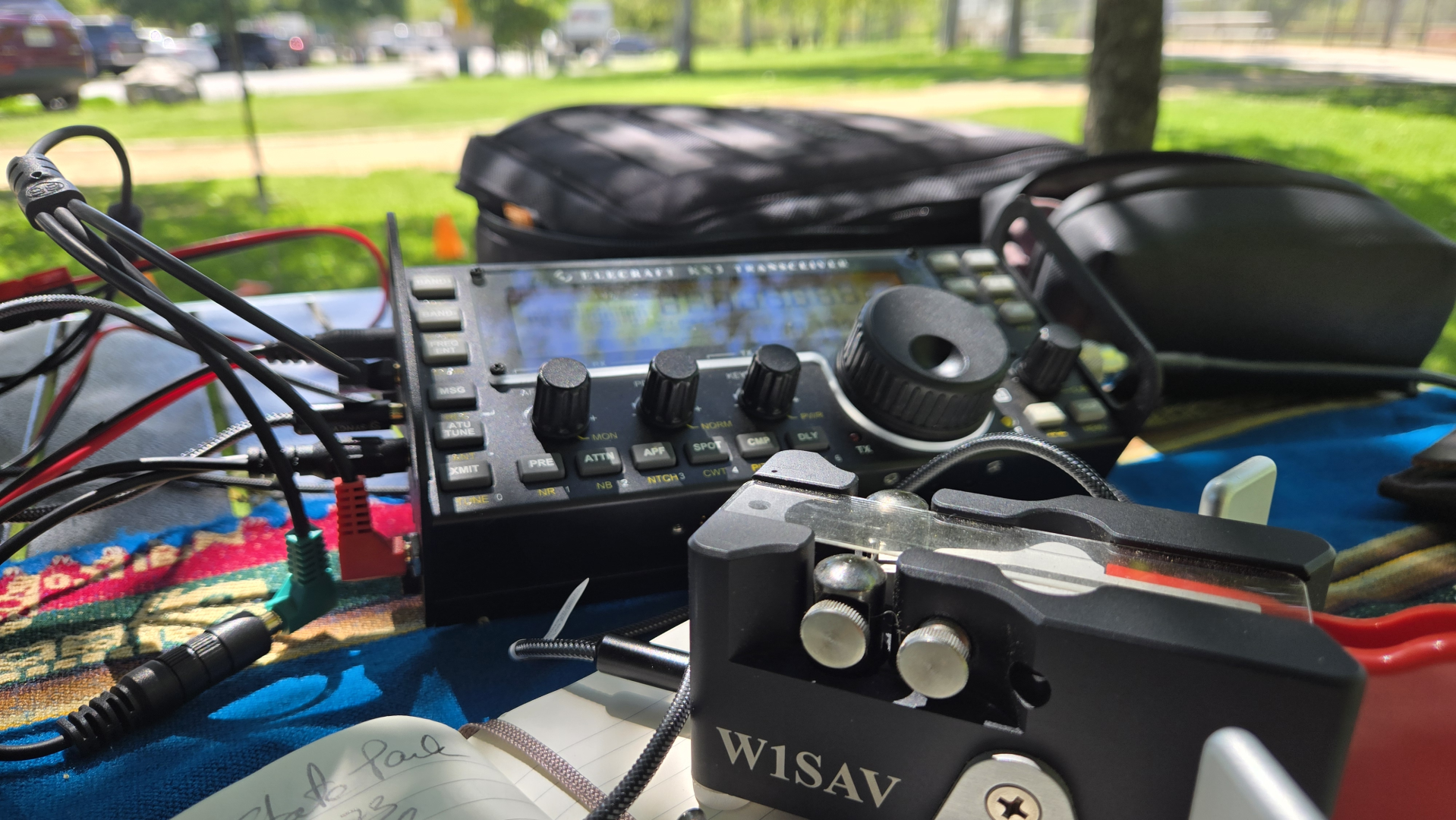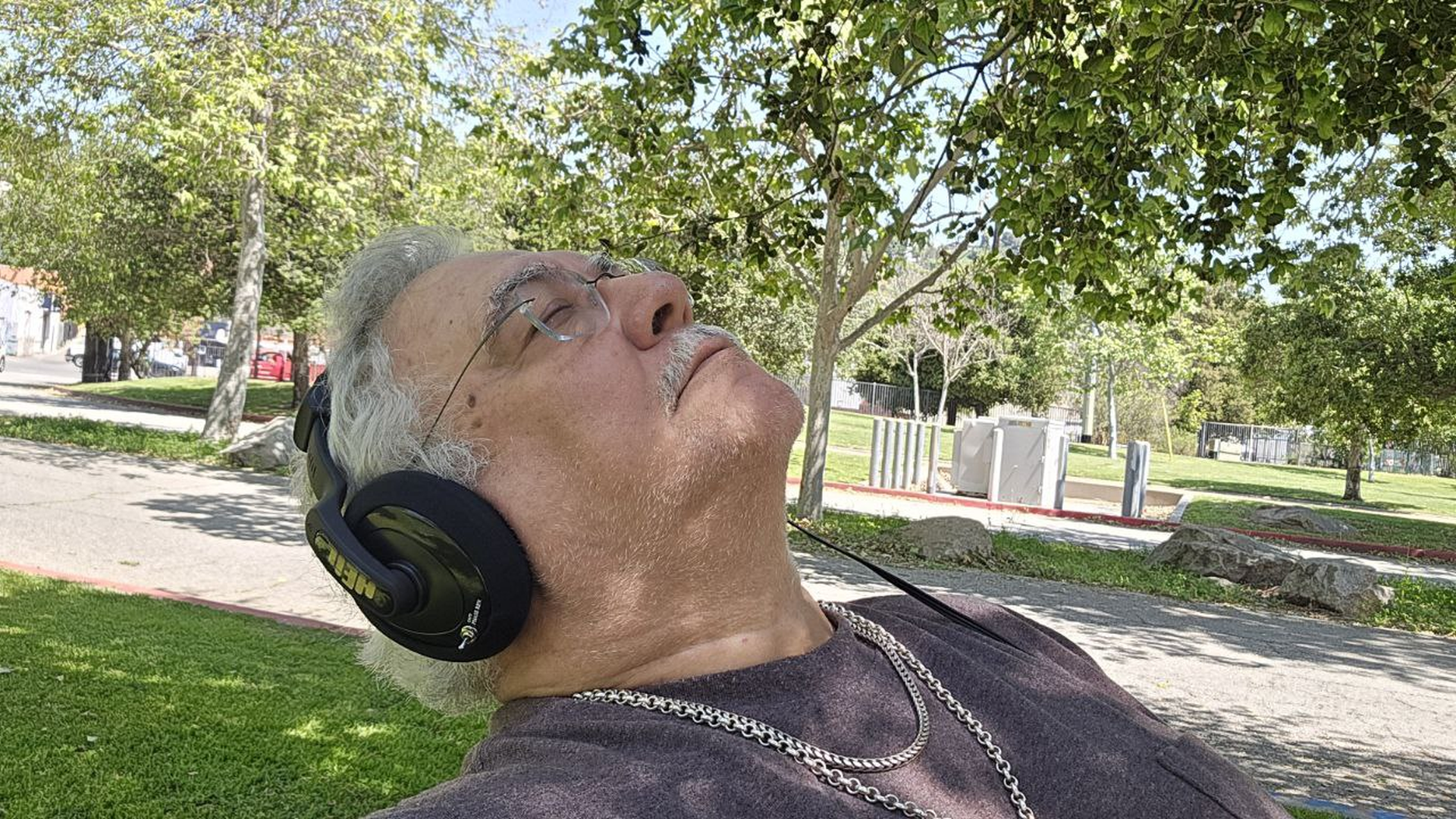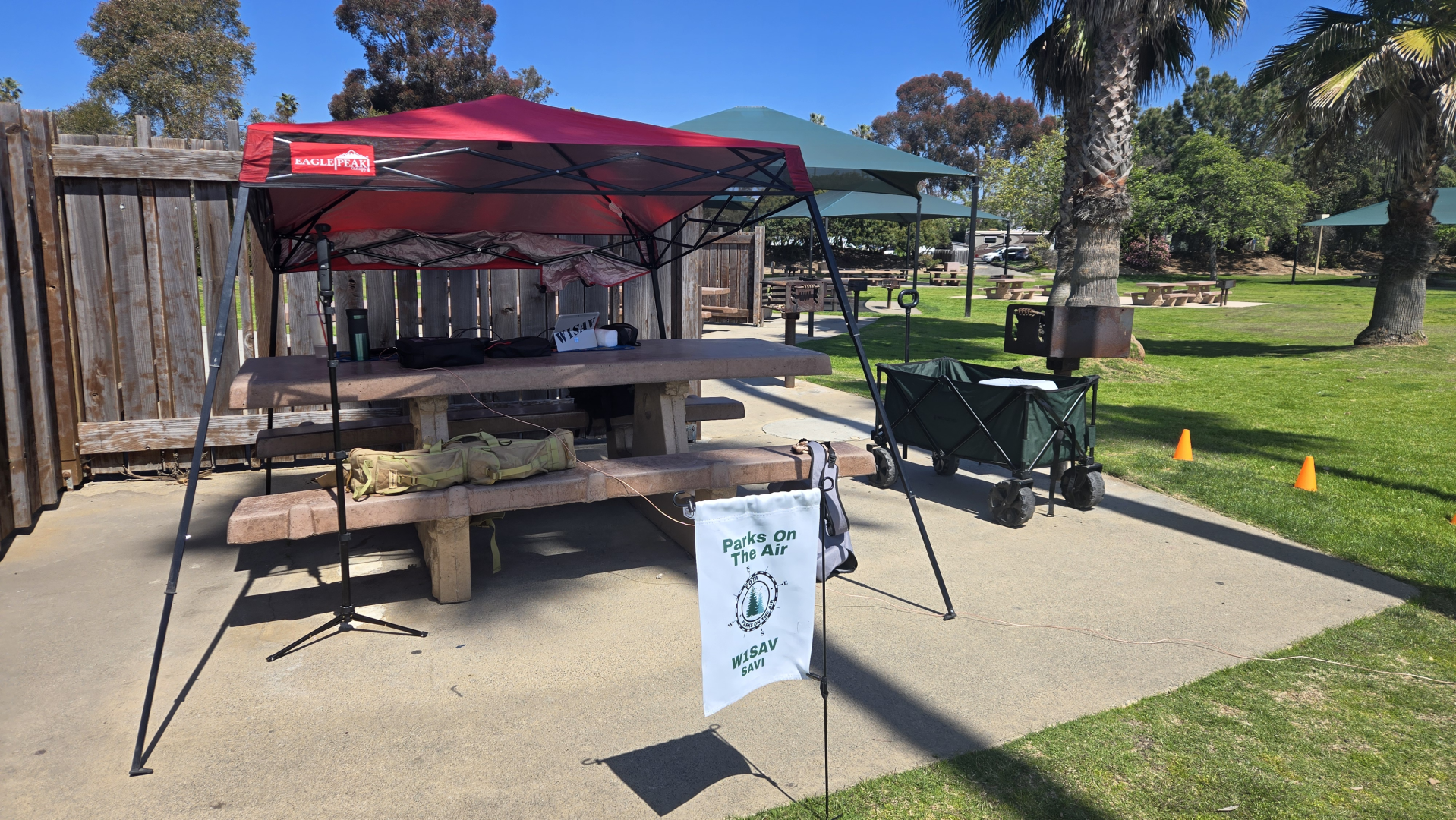Activated on 28 September, 2023

I’m back again at the same corner of Rio de Los Angeles State Park, this time for my third CW activation. Being a Thursday there were only two folks I saw; one was running his remote-control racer on the soccer field, and the other walking his dog while I was packing up. It was so quiet I did not bother to put the safety cones warning of my coax, antenna, and counterpoise. All I needed to do was concentrate on my activation.
My plan was to work 20 and 15 meters and use my antenna analyzer to check those two bands. As it turned out, both bands had sweeps of 2.9:1. My antenna tuner handled that issue without a problem. In fact, as I was scanning the band for a clear frequency, I kept seeing the “WAIT” prompt on the radio’s screen. That was the tuner automatically doing its thing and I was not used to it. Nice.
Several times throughout the activation I realized the breeze had just stopped. Nothing. It reminded me of the time when I was stationed in Missouri just before a tornado: no wind, no sound, not a leaf moving. So, I focused on one leaf nearby and saw it flutter slightly. All was right again and finished spotting myself on the POTA site.

My first band was 20 meters. I was sending my QRLs while an intermodal train slowly went by, evidently slowing down as the screeching brakes drowned my radio’s speaker. I should have pulled out my headphones then as this happened again later. Eventually I sent my first CQ and waited…and waited. I sure am glad my FT-891 has a record feature as I used the one-button technique to keep sending CQ.
After the breeze, no breeze, train, no train, CQ cycle with no results I moved over to 15 meters. Five minutes after doing so, and one hour after my first CQ on 20 meters, I got my first QSO. So maybe I should not wait so long next time. Maybe I should have checked the solar weather to see what the bands were predicted to be like. Maybe I’ll do that next time.
The first contact was in Pennsylvania, then South Carolina, Florida, and New York. It’s the east coast again. I’m not complaining, mind you, it’s a pattern I am detecting. It seems that from the eastern part of Los Angeles I hit the east coast regularly. I do activate around 1300 or so, local, so it’s just the way the band opens for me. I thought of how vertical my antenna was.

A video I saw on YouTube had a well-known ham, whose name I can’t remember, talking about placing his antenna at a slight angle off the vertical. His contention was that verticals have a low angle of take-off, so angling the antenna in the opposite direction of his intended path will elevate the take-off angle and therefore get further contacts. Hmm… My antenna was angled toward the east and 75% of my contacts were east of the Mississippi. Theories…
Additionally, another pattern I noticed is my set up: radio, tuner, and a vertical. If this works why change it? For one, the parks I frequent near Los Angeles frown upon wires in trees, especially since they are state parks. I am pushing it with a stake in the ground. Generally, the larger parks don’t care; but the smaller ones are very stringent. So, the pattern is out of necessity I suppose, but the set up works for me.
Then there was this M0 station. I was excited that I might get England! M0TT? M0M? KM0TT? Oh, well. I dropped the QSO as he was just too faint to copy. He was just barely above my noise floor. However, two contacts later M0TTQ came in readable enough to make the contact! England again! Of course, I was stoked. I sent him a 119 and received a 449 in return.

Still, time dragged for me on this outing. My QSOs were 6-7 minutes apart at first and their separation seemed like years. Thirty-five minutes after my first QSO I had nine contacts. I remember thinking to myself that all I wanted was to get one more, then split. About forty-one minutes into the activation, I got the tenth QSO. Now I can go, I thought.
Safety. They always tell you, “Safety first”. Considering my previous CW activations and the couple of bad QSOs both times, I realized I needed a safety QSO or two. Now I was wondering how long this would take. Just then, I started getting hunters about one every couple of minutes. This was great, I said, maybe I will get lots of safeties.
One of my safeties from the east coast (where else?) was moving at a rapid clip. Not sure I copied his call correctly, I di-di-dah-dah-di-dit-ed twice. He was in a hurry, I suppose, as he never slowed down, and reversed the sequence by sending his response first. I acknowledged, sent my part and was about to ask for his response as normal, then I realized all I had to do was close out the QSO. This happened to me several times while activating on SSB, so I knew what to do. It’s no big deal, just make sure you both get the information each needs. I was on CW though and I needed a little more concentration. In the end, I got the QSO and two more to finish my activation.

I sent my QRT fifty-five minutes after I logged my first QSO with sixteen entries in the log. On average, this is about one contact every three minutes, 26 seconds. Yet it seemed rather slow for me, to the point I was wondering if I was getting out. I suppose patience this day was in short supply. I think CW QSOs are supposed to come at me faster…because they are on CW? That doesn’t make sense, does it? These are some of the questions I am working through as I get used to activating in Morse Code. Eventually I’ll start doing hybrid activations on both SSB and CW. At the moment, however, I am not in any hurry.
Activation Statistics
| Activation Number | 25 |
| Date | 28 September, 2023 |
| Park | K-3548 Rio de Los Angeles State Park |
| Number of Contacts | 16 |
| DX Contacts | 1 |
| Park Activated? | Yes |
| Previous Attempts | 5 |
| Park to Park Contacts | None |
| Mode | CW |
| Radio | Yaesu FT-891 |
| Antenna | MPAS 2.0 in the vertical configutaion staked to the ground |
| Tuner | MFJ 939Y |
| Power | 50W using a 30Ah Bioenno battery |



Leave a Reply